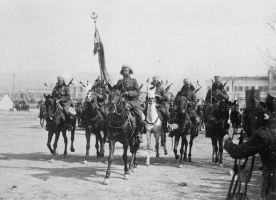The French in the Orient↑
After the disaster of the Dardanelles Campaign, allied troops were withdrawn. French forces were incorporated into the so-called Army of the Orient. Under the command of General Maurice Sarrail (1856-1929), the units landed in Salonika in October 1915, too late to have any impact on the disaster in Serbia.
General Sarrail had three goals. First, to save the retreating Serbian Army. Second, to maintain Greek neutrality. Third, to crush the Bulgarian Army. However, these objectives were not achieved. Firstly, the initial Entente effort had little effect on the Serbian retreat across the Albanian alps: the Allies only managed to save part of the Serbian Army (about 100,000 men). Secondly, on 3 December 1915, the Bulgarian 2nd Army forced the French to retreat. However, Sarrail took advantage of this situation to strengthen his positions.
All quiet on the Salonika Front?↑
Running from the Albanian part of the Adriatic coast to the Struma River, the Salonika Front remained stable, despite a large Allied offensive in the middle of the year 1917. The conditions of the war were unusual. The fighting that took place on the Salonika front was mountain warfare. The trenches were divided into sections. Therefore, the French troops could not use the full military resources of a modern war. This also explains why cavalry warfare had a limited utility on this front until September 1918. The General François Léon Jouinot-Gambetta (1870-1923) led a huge raid in a large area between Greece and North-Danube.
To all that must be added the fact that the logistic situation was problematic in this mountainous area. Twenty-two ships per month were necessary to supply the Allied military units. Furthermore, the army suffered from cold, illnesses (especially dysentery) and lack of infrastructure. Jules Bataille related that the construction and reconstruction of railways was painful. The French-English rivalry also complicated the situation. Above all, the British wanted to protect the Suez Canal. The French tried to support Serbia and Romania. The military situation seemed blocked. In September 1916, Sarrail led an attack. In spite of some success in the first days, the resistance of the Bulgarian troops gradually strengthened, blocking the situation on the Salonika front again.
The great Allied offensive in September 1918↑
Things started to get moving again after 1918. The military climate had changed. The Greeks joined the Entente effort in July 1917. The Army of the Orient was now under the command of General Louis Franchet d’Esperey (1856-1942), as he had replaced the General Adolphe Guillaumat (1863-1940), Sarrail’s successor. Decided on launching a major attack, Guillaumat restored confidence between the Allies, a step required for the success of his plan. In the meantime, Guillaumat prepared the troops for the battle by training soldiers, building infrastructure etc. In spite of his energetic command and some local victories, he was recalled to Paris in June 1918. He left behind an efficient military tool for his successor. The troops now numbered 650,000 men, including 210,000 French soldiers. The Vietnamese, Senegalese and Malagasy colonial forces served among the French units, as on the western front. Part of the 17th French Infantry Colonial Division also participated in the breakthrough battle of Dobro Pole.
Like Guillaumat, D’Esperey argued in favor of a large attack on the Bulgarian Army. He developed a plan, which was initially proposed by the Serbian staff. After an agreement between the French and British, the operations began. On 15 September, the Allied (among them French, Serbians and Italians) launched their offensive. The front was rapidly crushed. The Bulgarians were outmanned and unable to react. The Battle of Dobro Pole was decisive.
Domino effect in the Balkans↑
On 29 September, Bulgaria signed an armistice and ended its involvement in the war. This produced a domino effect in the whole area. The Serbo-French Army recaptured Serbia. On 10 November, the Danube was crossed, which threated the Austro-Hungarian Empire. The Hungarian government was obliged to sign an armistice.
Despite these facts, the French Army of the Orient was rapidly forgotten. It was a forgotten war with forgotten soldiers. The last French Soldiers returned to France in March 1919.
Yohann Chanoir, Collectif de Recherche International et de Débat sur la Guerre de 1914-1918
Section Editor: Alexandre Lafon
Selected Bibliography
- Bataille, Jules / Prigent, Julien / Richard, René: La campagne d'Orient de Jules Bataille au 1er Régiment du génie, octobre 1915-juin 1917. Et Les carnets de guerre de François Pouleriguen aux 52ème et 418ème RI, janvier 1916-mai 1919, Plessala 2005: Association Bretagne 14-18.
- Becker, Jean-Jacques: La guerre dans les Balkans (1912-1919), in: Matériaux pour l'histoire de notre temps 71/1, 2003, pp. 4-16.
- Cazals, Rémy: 500 témoins de la Grande Guerre, Portet-sur-Garonne 2013: Editions Midi-Pyrénéennes; Edhisto.
- Deygas, Ferdinand-Joseph: L'Armée d'Orient dans la guerre mondiale (1915-1919), Mayenne; Paris 1932: Payot.
- Ministère de la Guerre, État-Major de l'Armée (ed.): Les armées françaises dans la Grande Guerre, volume 8, Paris 1924: Imprimerie Nationale.
- Sarrail, Maurice: Mon commandement en Orient (1916-1918), Paris 1920: Flammarion.










